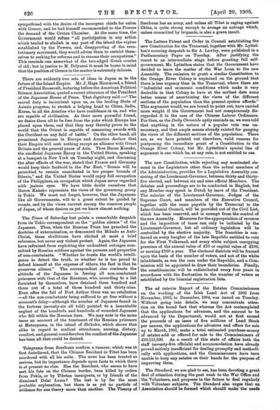The Times of Saturday last prints a remarkable despatch from
its Tokio correspondent on the "golden silence" of the Japanese. Thus, when the Russian Press has preached the doctrine of extermination, or denounced the Mikado as Anti- Christ, these ebullitions have elicited at most a brief reference, but never any violent protest. Again, the Japanese have refrained from exploiting the undoubted outrages com- mitted by Russian soldiers against the persons and properties of non-combatants. "Whether he trusts the world's intelli- gence to detect the truth, or whether he is too proud to defend himself at the expense of others, the fact is that he preserves silence." The correspondent also contrasts the attitude of the Japanese in freeing all non-combatant prisoners with that of the Russians, who, according to a list furnished by themselves, have detained three hundred and three out of a total of three hundred and thirty-nine. Even after the fall of Port Arthur there was no retaliation —all the non-combatants being suffered to go free without a moment's delay—although the number of Japanese found in the fortress (seventy-six all told) pointed to a lamentable neglect of the hundreds and hundreds of wounded Japanese who fell within the Russian lines. We may note in the same issue an account of the treatment of the Russian prisoners at Matsuyama, in the island of Shikoku, which shows that alike in regard to medical attendance, nursing, dietary, comfort, and general consideration the conduct of the Japanese has been all that could be desired.


















































 Previous page
Previous page